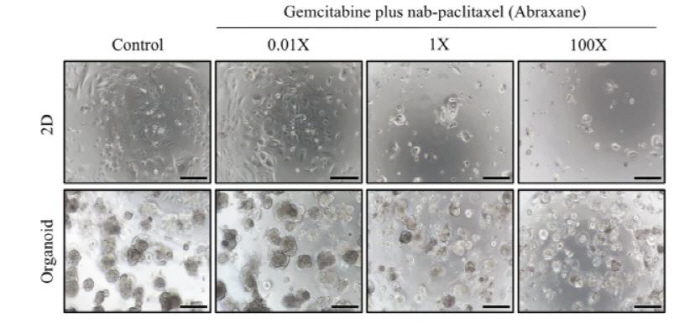Prediction of Pancreatic Cancer New Drug Effect with Mini Organoid Organoids...Accelerate the development of customized treatments and new drugs
|
Professor Bang Seung-min and Lim Gar-ram of the Department of Gastroenterology at Severance Hospital and assistant Kim Jin-soo of Yonsei University's School of Medicine announced on the 11th that they succeeded in producing organoids that have similar anticancer drug administration effects while maintaining the genetic characteristics of actual patients using cells from pancreatic cancer patients.
The results of this study were published in the latest issue of the world-class academic journal on cancer research 'Molecular Cancer (IF 27.7)'.
Pancreatic cancer is one of the deadly cancers with a 5-year survival rate of still only 10%, despite advances in various diagnostic and treatment techniques. Most of the patients are already diagnosed in the advanced stage, where surgery is difficult, and they have no choice but to rely on chemotherapy.
However, currently, there are no biomarkers to predict the therapeutic effect, so the choice of anticancer drugs depends only on the patient's condition or medical staff's experience. Accordingly, there is an urgent need to develop a model that can accurately predict the treatment response of each patient.
In addition, due to the small effectiveness of the first-line drug, most treatment guidelines recommend active participation in possible clinical studies from the first-line treatment, but pancreatic cancer does not have an appropriate preclinical model to accurately reproduce the patient's treatment response, making it difficult to design new clinical studies.
Previously, attempts have been made to predict patient treatment response and test new drugs by establishing an organoid model for pancreatic cancer, but the longer the exposure to growth factors during the organoid culture process, the more the original characteristics deteriorate, and the accuracy of the prediction results is reduced. Since only reactivity to a single drug can be predicted, it is difficult to predict the results of various combinations of drug administration.
The research team successfully developed a three-dimensional organoid model that reflects the genetic characteristics of actual patients using patient-derived pancreatic cancer cell lines accumulated over the past decade. The organoid model developed this time showed very similar predictive results to the actual treatment results when the combination of complex anticancer drugs actually prescribed to patients was applied in the same manner.
In particular, the research team developed a platform that can stably maintain organoids without including growth factors unlike the previous one, increasing predictive reliability while maintaining its original characteristics even in long-term culture. Through this, it is expected to be of practical help not only in patient-specific customized treatment but also in clinical research design and new drug development process.
Professor Bang Seung-min said "By developing a model that can accurately predict the treatment response of individual patients in advance, the possibility of providing optimal anticancer drugs on a personalized basis has opened up."
Professor Lim Garam added, `We expect this study to increase the success rate of clinical trials and dramatically reduce the cost and time required for the development of new drugs.'
|
This article was translated by Naver AI translator.





